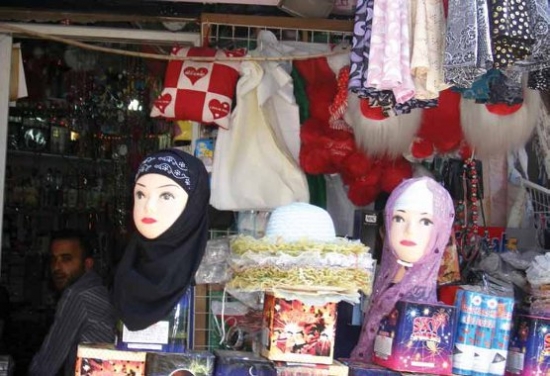
When the news of Gilad Shalit’s impending release in exchange for 1,026 Palestinians imprisoned in Israel was announced I was in Britain.
“Mom, Gilad is coming home next week,” I read on the small mobile telephone screen - the SMS message sent by my daughter in Israel. I fished in my bag for my reading glasses, fearful that I had misread the message, and for once I hadn’t!
Walking down Putney High Street at the time, if not for the noise of the traffic, the people passing me by on the pavement would have heard my heart pounding and seen a smile that could have lit up Blackpool illuminations without any electricity.
Overcome with tremendous relief and unabashed happiness, I looked around to see if there was someone – anyone – in the vicinity who looked as if his or her chest was going to burst along with mine, but nothing -"gurnischt"- as my Dad would have said.
Frantically, I wanted to share with all and sundry the phenomenal feeling of joy that Gilad, whose boyish looks would not have been out of place had he been wearing a school uniform and not that of the IDF when he was kidnapped, was being released from the Hamas Gaza hellhole he had been kept in.
When I reached the home of my South London cousin, bursting with the news and yelling, “Gilad’s coming home, Gilad’s coming home,” I realized from the mediocre response that the name didn’t mean much – had been known vaguely but forgotten. Nor was there any real understanding, after a discussion, that Gilad could have been one of my own four sons or that of one of my Israeli friends, fellow kibbutz members or work colleagues - that he could have been and over the years had become – the son, brother and friend of all.
By the time I returned to Israel the Shalit-Palestinian prisoner exchange had been made, and although still very much a topic of discussion, the initial excitement and media frenzy had calmed down.
A frequent visitor, within the framework of my work at the Givat Haviva Jewish-Arab Center for Peace, to the Wadi Ara village of Barta’a, part of which is in Israel and part in the West Bank under the Palestinian Authority, I was informed by a colleague that one of the released Palestinian prisoners was originally from East Barta’a. Following his release and banishment to Gaza – having served 18 years of a 30 year sentence – there had apparently been a huge celebration in East Barta’a (with its population of 5000). The fireworks had been seen for miles around by Israeli Arabs and Jews living in the Wadi Ara region.
Many people in the area took the celebrations in East Barta’a - situated west of the electronic surveillance fence constructed in recent years and the pre-1967 ‘Green Line’ - as a show of support for Hamas and terrorism, a fact that didn’t ring true with this writer, familiar with the village residents for over 20 years.
“The celebration had nothing to do with Hamas but everything to do with a family celebrating the release of a close family member,” explained one of the local East Barta’a Palestinian merchants who said that Thaher Kabha, the released Palestinian, had been sentenced to 30 years imprisonment in the early 1990s for allowing a Palestinian suicide bomber from a nearby West Bank village to stay overnight in his home. He also said that Kabha hadn’t known that his house-guest had had explosives on him and was on his way to carry out a suicide bombing the following day in the Israeli town of Hadera, a half hour drive away.
“Thaher was engaged to a local girl and she has waited 18 years for him,” explained the same merchant. “When it became known that he was going to be released she went to Jordan and from there to Egypt in order to be in Gaza to welcome him. They were married immediately and the celebration here in East Barta’a was to join his father (his mother died some years ago) and the family of the bride, in a wedding celebration, although the wedding actually took place in Gaza,” he said.
“It had nothing to do with whether he did or he didn’t deserve to be in prison, nothing to do with politics or nationalism or anything else you want to throw in. It had everything to do with a family celebrating with and supporting close family,” he explained.
A local restaurant owner in East Barta’a reiterated the story, and when asked if there was a possibility of Hamas representatives being active in the village, as had been suggested to this writer, he laughed.
“Nobody here wants any trouble. We are busy working hard to make a living and East Barta’a is doing well commercially so why would anyone want to endanger that? ” he asked.
Agreeing with the restaurant owner, another local Palestinian merchant added that most East Barta’a folk were relieved that Thahar Kabha had been released to Gaza and not to East Barta’a.
“We are happy for his close family that he is out of prison, and happy for the girl’s family that she could marry the man she waited for so long – but we are also happy he isn’t here bringing attention of the type we definitely do not need or want,” he added.
 ESRA College Netanya is reborn
ESRA College Netanya is reborn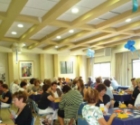 ESRA HERZLIYA ACTIVITIES
ESRA HERZLIYA ACTIVITIES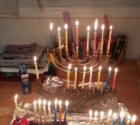 Chanukah Celebration at ESRA Rishon LeZion
Chanukah Celebration at ESRA Rishon LeZion 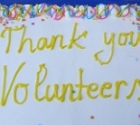 A new website in English - on Volunteering - Launched in Israel
A new website in English - on Volunteering - Launched in Israel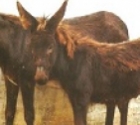 Help Needed for Abused Horses and Donkeys
Help Needed for Abused Horses and Donkeys Heather's Heseg
Heather's Heseg Lydia Aisenberg
Lydia Aisenberg